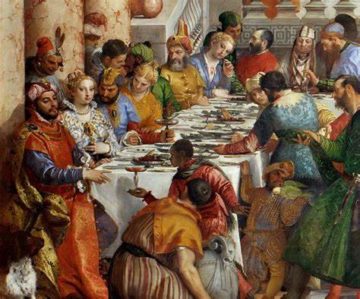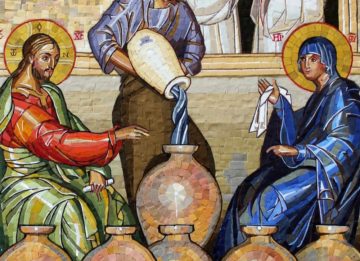As we prepare ourselves for the liturgy of the Second Sunday of Ordinary Time, Franciscan Friar Fr. Paul Gallagher offers us these Gospel Reflections. The content is edited by Franciscan Sister of Christian Charity Sister Anne Marie Lom and Joe Thiel. The excerpts from the Sunday readings are prepared by Joe Thiel. To read or download the complete pdf with excerpts for your prayer, please click here: Franciscan Gospel Reflection January 16 2022. Excerpts are from the Lectionary for Mass for Use in the Dioceses of the United States of America, second typical edition © 2001, 1998, 1997, 1986, 1970 Confraternity of Christian Doctrine, Inc., Washington, DC. Used with permission. All rights reserved. No portion of this text may be reproduced by any means without permission in writing from the copyright owner. bensozia: Paolo Veronese, The Wedding at Cana (benedante.blogspot.com); Second Sunday in Ordinary Time, Cycle C (belmontabbey.org.uk)
John 2:1-11
 There was a wedding in Cana in Galilee, and the mother of Jesus was there. Jesus and his disciples were also invited to the wedding. When the wine ran short, the mother of Jesus said to him, “They have no wine.” Jesus said to her, “Woman, how does your concern affect me? My hour has not yet come.” His mother said to the servers, “Do whatever he tells you.” Now there were six stone water jars there for Jewish ceremonial washings, each holding twenty to thirty gallons. Jesus told them, “Fill the jars with water.” So they filled them to the brim. Then he told them, “Draw some out now and take it to the headwaiter.” So they took it. And when the headwaiter tasted the water that had become wine, without knowing where it came from (although the servers who had drawn the water knew), the headwaiter called the bridegroom 1and said to him, “Everyone serves good wine first, and then when people have drunk freely, an inferior one; but you have kept the good wine until now.” Jesus did this as the beginning of his signs in Cana in Galilee and so revealed his glory, and his disciples began to believe in him. After this, he and his mother, (his) brothers, and his disciples went down to Capernaum and stayed there only a few days.
There was a wedding in Cana in Galilee, and the mother of Jesus was there. Jesus and his disciples were also invited to the wedding. When the wine ran short, the mother of Jesus said to him, “They have no wine.” Jesus said to her, “Woman, how does your concern affect me? My hour has not yet come.” His mother said to the servers, “Do whatever he tells you.” Now there were six stone water jars there for Jewish ceremonial washings, each holding twenty to thirty gallons. Jesus told them, “Fill the jars with water.” So they filled them to the brim. Then he told them, “Draw some out now and take it to the headwaiter.” So they took it. And when the headwaiter tasted the water that had become wine, without knowing where it came from (although the servers who had drawn the water knew), the headwaiter called the bridegroom 1and said to him, “Everyone serves good wine first, and then when people have drunk freely, an inferior one; but you have kept the good wine until now.” Jesus did this as the beginning of his signs in Cana in Galilee and so revealed his glory, and his disciples began to believe in him. After this, he and his mother, (his) brothers, and his disciples went down to Capernaum and stayed there only a few days.
Background:
Next Sunday the Gospel will again be drawn from Luke’s Gospel. But this Sunday, the gospel text describes Jesus’ first miracle, at a wedding feast in Cana, as described by John.
It is believed by scripture scholars that John draws from a source of miracle stories of Jesus in order to write his gospel. That source was originally used to help convince Greek-speaking Jews that Jesus was indeed the long-awaited messiah. Then, after the fall of the temple in Jerusalem, the Christian community was facing a different struggle. The Christians were being blamed for Rome’s actions and were not welcome at the temple. Many of the early Christian Jews were keeping their belief in Jesus a secret, so that they could still worship at the temple and maintain their relationships with their Jewish neighbors and family. Many thought it was time for these people to commit to being followers of Jesus and openly be part of the Christian community.
John’s gospel is rich with symbolic images. The second-to-last sentence of today’s gospel states that this was the first of Jesus’ signs. There are seven signs in John’s gospel; each one points beyond the event itself to a deeper understanding of Jesus’ significance. The last and greatest sign in John’s gospel is Jesus’ death and resurrection.
Another way that John links this event with the death and resurrection is through Jesus’ reference to his “hour” in verse 4. Throughout John’s gospel, “the hour” is used as the hour of Jesus’ death and resurrection. (2:4, 4:21, 5:25, 5:28, 7:30, 8:20, 12:23, 12:27, 13:1, 16:4, 16:21, 16:25, 16:32, 17:1, and 19:27)
In the Hebrew Scripture, the wedding banquet is a rich symbol for the final fulfillment of God’s relationship with the chosen people. In this tradition, God is often described as the bridegroom.
The large water jars were on hand so the guests could perform purification rituals. Jesus asks that the jars be filled with water and taken to the headwaiter. The water had been transformed into the finest of wines. At the Last Supper, Jesus will take the wine and transform it into his own blood, which will be poured out on the cross in the purest of sacrifices.
Jesus’ response to his mother as “woman” may sound harsh. However, in their time, this was a customary way to address a woman. At the same time, to refer to one’s mother with this title without further amplification would have been unusual. Young men in this culture had strong emotional ties to their mothers. But when they entered puberty, the young men became the responsibility of the rest of the men, who were to prepare the young men for the male adult roles in their culture. Physical punishment was commonly used as a tool to toughen them. The young men sought emotional independence from women in general, and especially from their mothers, and tried to reject their mothers’ claims on them. This would be particularly true in public situations like the one described at the wedding feast. In this light, the behavior of both Mary and Jesus may express a mother and her son trying to navigate new roles as adults within their culture. In one sense, the text demonstrates Jesus trying to be a typical young man of his day. But the text also portrays Mary and Jesus responding to one another and their guests with a compassion that would be more unusual for the day. For Mary to then tell the servants to do whatever Jesus asked of them suggests that she knew another part of her son. Jesus’ responses to Mary and to the needs of the culture after his initial comment to his mother also demonstrate his inner strength.
Reflection Questions:
- Think of a large family celebration like a large wedding and reception. What roles do different family members play in order for these celebrations to go smoothly?
- Recall the last celebration of this sort that you personally attended. What things stand out to you about that experience?
- Are you aware of events in your life that had greater symbolic importance than you realized at the time?
- If you were one of Jesus’ early disciples and overheard his mother say to him that they have run out of wine, what might have you whispered to one of the other disciples seated with you?
- What might you have commented to that friend as you witnessed Mary going over to address the servants?
- Then as Jesus went over to speak with the servant himself, what would you have been thinking? What would you have been feeling?
- It must have taken a good amount of time for the servants to get water from a well and fill six large jars with water. What would have been the mood of Mary, Jesus, the servants, and the guests as word spread that they were out of wine?
- Can you take some time now to talk to God about Jesus’ relationship to his mother, his apparent reluctance to do anything at this point to draw attention to himself, or some other thought or feeling that arose within you from this text?


